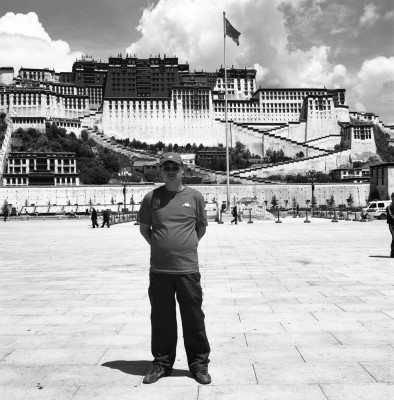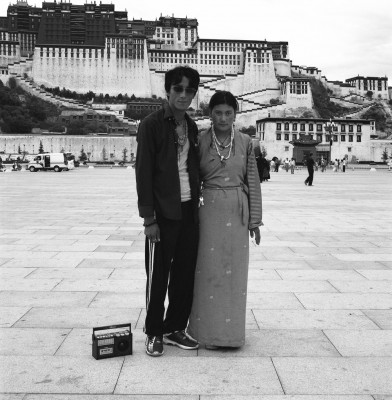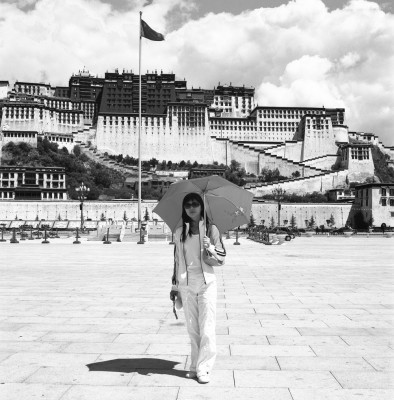

Excerpt from: News from No Man's Land
Michael Hoepfner talks with Christian Kravagna and Christian Reder (the latter is the producer of this transcript).
Christian Reder: Parallel to accelerating everything and everybody, there are contrary positions as well as those intended to slow things down: Ivan Illich, the Austrian-born, Mexico-based technology skeptic, pleaded for walking everywhere whenever possible, for not moving any faster than a bicycle or an ox-drawn cart as a prerequisite for world perception. He regarded his own frequent flying as an interim compromise. The title Sten Nadolny gave his book The Discovery of Slowness almost gained the status of a slogan – for an unrealistic agenda. Your images slow events down further: down to a standstill, a different tempo too.
Michael Hoepfner: I address what walking really means to me. In Land Art, by Richard Long for instance, his walking gains the significance of a sculpture. In my case, though, it's clearly about achieving a different – heightened – state of perception: Taking a trip, like taking drugs. Part of it is the unfamiliar, traveling in remote places. If that becomes a nomadic myth, as it did for Bruce Chatwin, then it goes too far. We remain part of a society of tourists.
Christian Kravagna: Land Art is conceptual. Concept art can be staged for the camera, and that’s it; it’s a context of its own. Your art, your approach, actually lives from real activity, the process of actually walking, arriving at different and unfamiliar perspectives by going slowly. What exactly are you pursuing?
Michael Hoepfner: It begins with a sense of longing, wanting to see beyond, behind, the horizon. On my travels in Central Asia, Tibet and West China, it became obvious that I was actually immersing myself in living conditions totally foreign to me, because of the exposure. I encountered certain personal physical limits, but at the same time was also confronted with the way the people there survive.
Christian Reder: A lasting memory of mine is of running into two Tuareg accompanied by loaded camels who were on their way from Libya to Niger on foot, just to visit some friends. That's the same distance as New York to Los Angeles. Because we aren't capable of living like that we don't understand the way they live, something that would be a key factor for taking any kind of a global approach. Who would be able to envisage surviving on 20 or 60 Euros per month, perhaps a preliminary issue for any debate on Orientalism or post-colonialism?
Christian Kravagna: The acceptance of different ways of life is also a key issue for me: even as a way to question one's own categories of thinking or the standard yardsticks for modernization.
But the 60 Euro situation can be compared to the existential difficulty of living on 600 Euros in our latitudes – for a single mother with a child, for example.
Michael Hoepfner: Attempting to understand others confronts you with your own culture. The result is looking back and forward. Your origins appear in a different light.
Christian Reder: Respect for forms of survival that are well beyond our own capacity increases one's awareness in many ways. When the electricity is cut off where we come from everything stops, even my PC. The level of dependency is constantly increasing; it's the price we pay for comfort. Traditional societies, which we're talking about, are characterized by incredible improvisation in comparison. Is that the secret fascination?
Michael Hoepfner: The simple rules behind the organization of a nomad camp are impressive, while the collapse of these ways of life is to be observed everywhere. So I always wonder to what extent my romantic search for authenticity is based on self-deceit. Was there ever such a thing?
Christian Reder: In his book Studien zur nächsten Gesellschaft [Studies on the Pending Society – not translated into English] Dirk Baecker insistently poses the question of the direction societies take when they break down.
Important is the continuity and that what follows next remains recognizable as a society. The belief that things are getting worse is just a belief. Even positive advances personally experienced are soon forgotten. Perhaps the prospect is just more bleak.
Christian Kravagna: The incredible creativity found under conditions of economic scarcity has a correlation to experiments carried out in survival camps or to the history of modern development, which has repeatedly been defined in terms of a view of this other at least since the 19th century. In your work you touch on what these different living environments share in economic, political and cultural terms. As an artist the aim can't just be to satisfy yourself. How does this tie into in your approach as an artist?
Michael Hoepfner: For a while untouched deserted landscapes were important as images of longing, as a way of engaging with things that are disappearing. It went so far that I even felt I was disappearing myself, quasi-dissolving. This wasn’t going anywhere in terms of the statement it made, making the incorporation of social elements necessary – carefully, by insinuation. To analyze the predetermined I increasingly try to visualize the gap between a longing for authenticity and the reality precisely, with staged photographs of people I encounter that have deliberate associations with early ethnographic photographs. I widen the scope of my work by not concealing the Western perspective or playing it down.
Christian Reder: A yearning for nature became more extreme with increasing industrialisation, expressed also in mountaineering and climbing in general. Moving between civilization and wilderness has its history too.
Instead you walked through Tibet. Just going through Bhutan costs a fortune. Why, though, are more aware people more frequently to be encountered in simple accommodation than in luxury temples, the prototypes for a beautiful life worthy of imitation? I see connections here to our questions about the foreign: One's own society is becoming increasingly alien, more unpleasant, due to a talk show people presented as increasingly infantile from year to year. It's as if there’s a deliberate agenda of alienation behind it. The distant is easier to respect, like in James Cook's day. Cook travelled with scientists and draftsmen like Georg Forster. Those were highlights in phases of otherwise increasing brutality. I'd have liked to have been there, perhaps Michael Hoepfner would've too.
Christian Kravagna: I'm skeptical there, because the scientific and artistic achievements running under the heading 'Enlightenment' created the basis for the domination and exploitation of the colonial system. Anxiety about nature arose with that kind of generation of knowledge, with the glorification of nature, the kitsch. I'm interested in this ambivalence because solutions need to be worked out under modern conditions – without invoking the ostensibly ‘simple life.’
